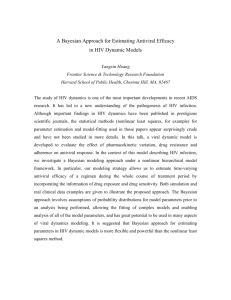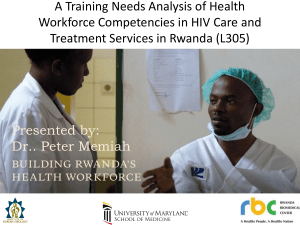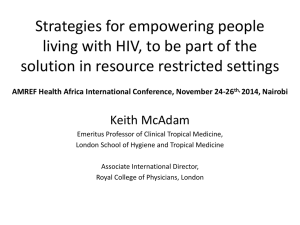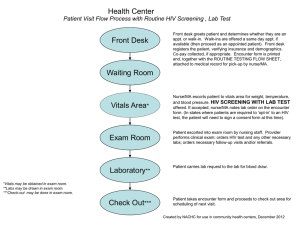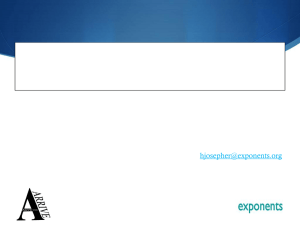Terms of Reference
advertisement
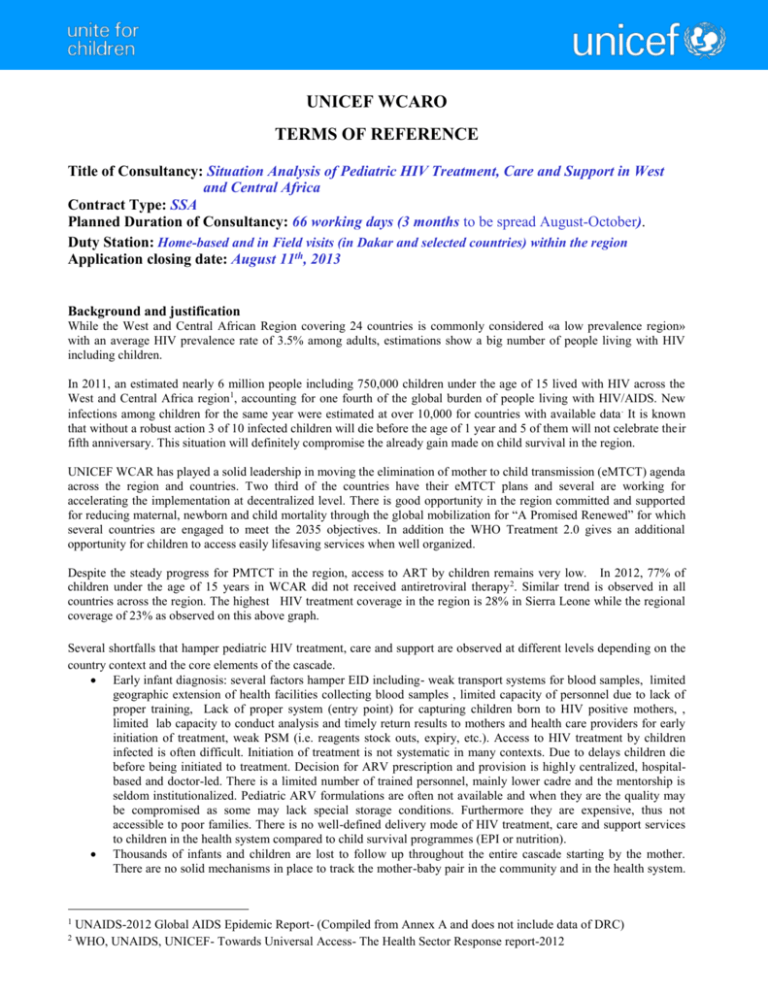
UNICEF WCARO TERMS OF REFERENCE Title of Consultancy: Situation Analysis of Pediatric HIV Treatment, Care and Support in West and Central Africa Contract Type: SSA Planned Duration of Consultancy: 66 working days (3 months to be spread August-October). Duty Station: Home-based and in Field visits (in Dakar and selected countries) within the region Application closing date: August 11th, 2013 Background and justification While the West and Central African Region covering 24 countries is commonly considered «a low prevalence region» with an average HIV prevalence rate of 3.5% among adults, estimations show a big number of people living with HIV including children. In 2011, an estimated nearly 6 million people including 750,000 children under the age of 15 lived with HIV across the West and Central Africa region1, accounting for one fourth of the global burden of people living with HIV/AIDS. New infections among children for the same year were estimated at over 10,000 for countries with available data . It is known that without a robust action 3 of 10 infected children will die before the age of 1 year and 5 of them will not celebrate their fifth anniversary. This situation will definitely compromise the already gain made on child survival in the region. UNICEF WCAR has played a solid leadership in moving the elimination of mother to child transmission (eMTCT) agenda across the region and countries. Two third of the countries have their eMTCT plans and several are working for accelerating the implementation at decentralized level. There is good opportunity in the region committed and supported for reducing maternal, newborn and child mortality through the global mobilization for “A Promised Renewed” for which several countries are engaged to meet the 2035 objectives. In addition the WHO Treatment 2.0 gives an additional opportunity for children to access easily lifesaving services when well organized. Despite the steady progress for PMTCT in the region, access to ART by children remains very low. In 2012, 77% of children under the age of 15 years in WCAR did not received antiretroviral therapy 2. Similar trend is observed in all countries across the region. The highest HIV treatment coverage in the region is 28% in Sierra Leone while the regional coverage of 23% as observed on this above graph. Several shortfalls that hamper pediatric HIV treatment, care and support are observed at different levels depending on the country context and the core elements of the cascade. Early infant diagnosis: several factors hamper EID including- weak transport systems for blood samples, limited geographic extension of health facilities collecting blood samples , limited capacity of personnel due to lack of proper training, Lack of proper system (entry point) for capturing children born to HIV positive mothers, , limited lab capacity to conduct analysis and timely return results to mothers and health care providers for early initiation of treatment, weak PSM (i.e. reagents stock outs, expiry, etc.). Access to HIV treatment by children infected is often difficult. Initiation of treatment is not systematic in many contexts. Due to delays children die before being initiated to treatment. Decision for ARV prescription and provision is highly centralized, hospitalbased and doctor-led. There is a limited number of trained personnel, mainly lower cadre and the mentorship is seldom institutionalized. Pediatric ARV formulations are often not available and when they are the quality may be compromised as some may lack special storage conditions. Furthermore they are expensive, thus not accessible to poor families. There is no well-defined delivery mode of HIV treatment, care and support services to children in the health system compared to child survival programmes (EPI or nutrition). Thousands of infants and children are lost to follow up throughout the entire cascade starting by the mother. There are no solid mechanisms in place to track the mother-baby pair in the community and in the health system. 1 2 UNAIDS-2012 Global AIDS Epidemic Report- (Compiled from Annex A and does not include data of DRC) WHO, UNAIDS, UNICEF- Towards Universal Access- The Health Sector Response report-2012 There is sometimes a complete disconnect between HIV and majority of child health service delivery points and modes. Community response in relation to pediatric AIDS is missing. As mentioned above, factors limiting children’s access to ARV treatment vary according to contexts. To gain a better understanding of these factors in WCAR countries and to inform required corrective actions to address them, a structured situation analysis is proposed to assess programmes and; identify innovative and catalytic actions that could engender a positive shift in Pediatric HIV treatment, care and support. It will also serve as a gateway to care and support to adolescents living with the virus, another missing face of the HIV response. Based on the findings from this analysis, strategic actions adapted to the regional and country context will be defined and support will be provided to selected countries to improve children’s lives. We recognize that countries or UNICEF-CO might have conducted situational analysis covering HIV. However SITAN for country programme do not allow in-depth analysis as this current one where bottlenecks related to programming environment, social, supply, demand and quality aspects are analyzed. In addition, countries will be grouped by typology for organizing support. Thus this will give a better insight in the response for paediatric HIV infection in the region. The Regional Office seeks a qualified professional to conduct this situation analysis. Purpose and Objective The overall purpose of this consultancy is to conduct a situation analysis aimed at identifying and analyzing bottlenecks and defining actions for accelerating and improving access to Pediatric HIV Treatment, Care and Support by both exposed and infected children in West and Central Africa. i. Describe existing EID mechanisms with specific focus on blood sample collection system, laboratory capacity, early initiation of treatment for children infected with HIV, follow up and retention in care and operational linkages with existing programmes, including lessons learnt , innovations ii. Identify and analyze key bottlenecks and disparities, including social, policy and programming environment, health and community systems bottlenecks that limit provision of quality paediatric HIV treatment, care and support to needy children, either exposed or infected. Some of the questions to answer will be and but not limited to the following: iii. Determine innovative strategies and actions according to countries’ typology and challenges to improve and accelerate access to HIV treatment and care by children with focus on the identification of HIV exposed and infected children, initiation and retention in care and treatment, improved programming environment (data driven planning and routine monitoring) and strengthening post natal care for better linkages Expected results of the situation analysis a. b. c. d. EID, treatment initiation and retention mechanisms defined in the region with specific focus on common aspects and trends Key bottlenecks identified as well as country typology defined Innovative actions related to typology and models of care identified TA needs defined for both regional and HQ support. Methodology and Technical Approach A lead consultant will be recruited. In each selected country a national consultant will be recruited or a working group set up for the purpose. In any case all partners at country level should be involved. In place where there is ANECCA, present, it will be important to involve them in the working group process. At regional level, the HIV Section and PME and ACD Section will work closely to support the process. TOR and report will be shared with other regional partners as well (WHO, WHO, EVA/ESTHER, ANNECA, EGOAF? etc…) for their contribution. Under the supervision of the Senior PMTCT/Paediatric Specialist (UNICEF Regional Office HIV Section) and in collaboration the UNICEF Regional Office PME team, the incumbent will work with PMTCT and paediatric HIV treatment focal points from countries and other key partners’ focal points for planning and conducting the work. It will entail three steps: a. Develop a protocol that define methodological design, implementation plan and data analysis plan and a tool to identify, analyse Paediatric AIDS treatment care and support bottlenecks and disparities, document lessons learnt; and orient countries to use the tool. Standardized methodology and questionnaire will be developed by the consultant with the support of the HIV team and shared with country teams. The methodology will be a mixed methodology of qualitative interviews, data gathering/abstractions and exit Interviews to elicit client perspectives. In addition the protocol will include a component of the review of the patient monitoring system. 2 b. Collect and analyse the data information/Data using the methodology and tool above- This will be done through : Literature review. It includes assessment, evaluation and programme documents from countries representing different typologies. Orientation of country team on the methodology and how to sue the tool Field visit will also be conducted in selected countries by the consultant, probably the 6 priority ones (Cameroon, Chad, Nigeria, Ghana, DRC and Cote d’Ivoire). Criteria for selecting those countries may be reconsidered during the process. In sites to be visited by the consultant qualitative interviews of key informants from national and sub-national levels will be conducted, and quantitative data from HIV exposed/EID, ART, laboratory and pharmacy and MNCH services, including ANC and postnatal care services in visited facilities will be gathered and analyzed. The patient monitoring system will be reviewed. Patient level data will be abstracted in selected sites as much as possible. Additionally data collation will be extended to existing community care systems dealing with children and mothers as well some qualitative data from the client perspective. Case study will be also conducted in few of the countries. In the remaining countries, country teams will conduct the review of their programmes through the technical work group or task team and give feedback to the consultant based on the tool developed for that purpose. Identification and analysis of Paediatric AIDS treatment care and support bottlenecks and disparities (EID, Treatment initiation and retention in care), document lessons learnt Development of country typology based on key findings. c. Develop key contextualised and innovative actions and models of care based on key findings that can be easily applied by countries according to their situation- This will help and serve as a How to tool for countries reference. Countries’ road map and the technical assistance needs to the countries in the region for implementing priority actions will be developed. Specifically the consultant will be responsible for the following tasks: Activities, Tasks, Outputs and Deliverables Tangible and measurable outputs of the work assignment (e.g. end products) including qualitative & quantitative expectations: 1. Tasks Assessment and case study End products/deliverables Define a detailed methodology, including tool to conduct the process and support countries A work plan including well defined methodologies Compile documentation on existing evaluation, assessment, initiatives and programme documents to inform the process Orient country teams on the methodology and on how to use the tool – Through a webinar Conduct a literature review of existing documents in the region or outside the region on paediatric treatment. Required documents available for reference Collect data related to paediatric HIV infection in selected countries representing different typologies of PMTCT performance. Generate from data collected key interventions implemented, key bottlenecks in the provision of Paediatric HIV Treatment as well as best practices for accelerating Paediatric HIV treatment, care and support. Define country typology based on the situation. Summary of implemented key and innovative strategies, approaches on Paediatric AIDS treatment Relevant information available Challenges and bottlenecks identified Develop a draft report and submit for comments. Countries categorised by programme bottlenecks Draft report Finalise situational analysis report in soft and hard copies to the RO. Final report 2. Development of contextualized strategies and actions Define strategic and innovative strategies and actions to be implemented in each country for improving the overall treatment in children according to the findings and the country typology. Finalise and submit the final strategy document in soft and hard copies to the RO. Strategies and actions by typology defined Final document for countries’ reference 3 Management, Organization and Timeframe The consultant will work under the overall guidance of the Sr. PMTCT Specialist, UNICEF WCARO Working days: 66 (3 months) for the lead consultant and 1 month for the national consultant Qualifications of Successful Candidate The international consultant will be recruited at a P4 level. S/He will lead the process and supervise the national consultant. The required qualification and experience are: 1. Advanced university degree in Public Health, medical sciences, social sciences or any related field (MPH or PhD) 2. Eight years or more experience in programme design, planning, monitoring and evaluation in the field of HIV&AIDS and HIV pediatric 3. Analytical and conceptual ability; communication skills. 4. Competencies in strategic thinking programme planning and implementation. 5. Skills in research methodology and statistical analysis. 6. Demonstrated ability to work in multi-cultural environment. 7. Understanding of the current HIV situation, regional and developing countries HIV Response, with particular focus on eMTCT and Paediatric AIDS treatment. 8. Fluency in English and French- communication, report writing with critical analysis. -------------------------------------------------------------------------------------------------------------------------------------If you are qualified and interested in the position and meet the requirements, please forward your application with updated curriculum vitae and UN Personal History Form (available at www.unicef.org/employ)), with “Peadiatric HIV Treatment, Care and Support in West and Central Africa Consultant’’, via email to. enyankesha@unicef.org with cc to wcarohr@unicef.org by August 11th. 2013. UNICEF is committed to diversity and inclusion within its workforce, and encourages qualified female and male candidates from all national, religious and ethnic backgrounds, including persons living with disabilities, to apply to become a part of our organization. 4

